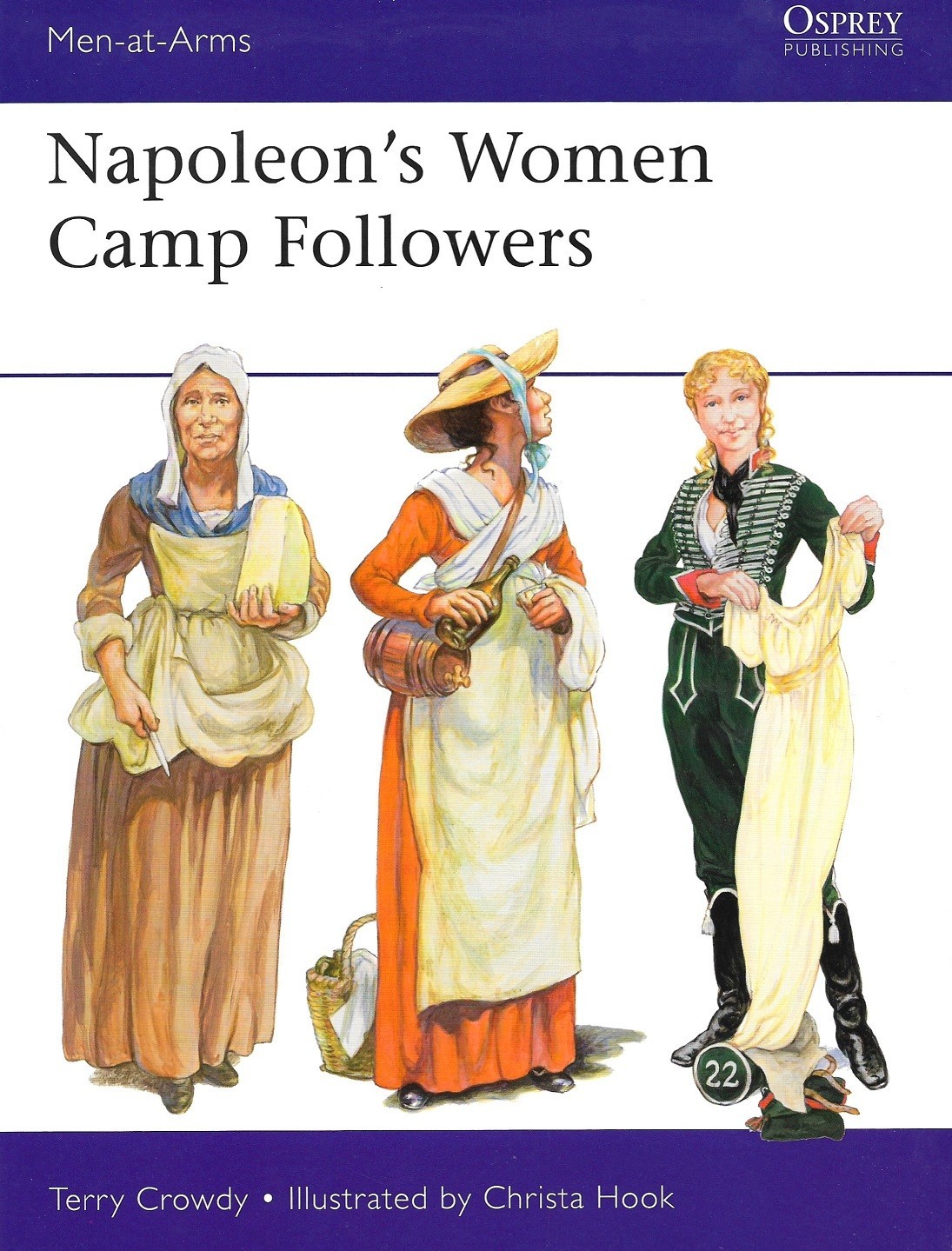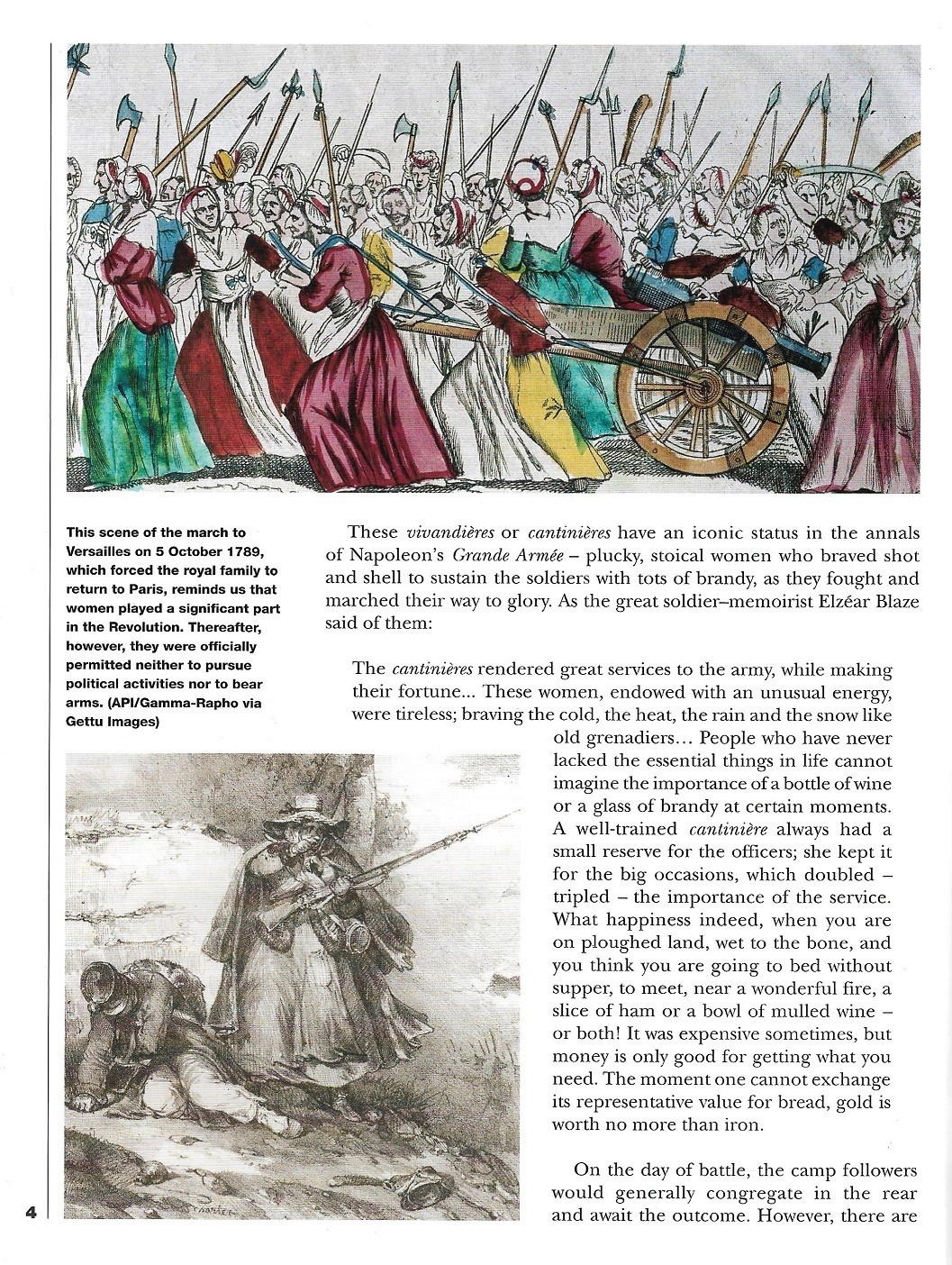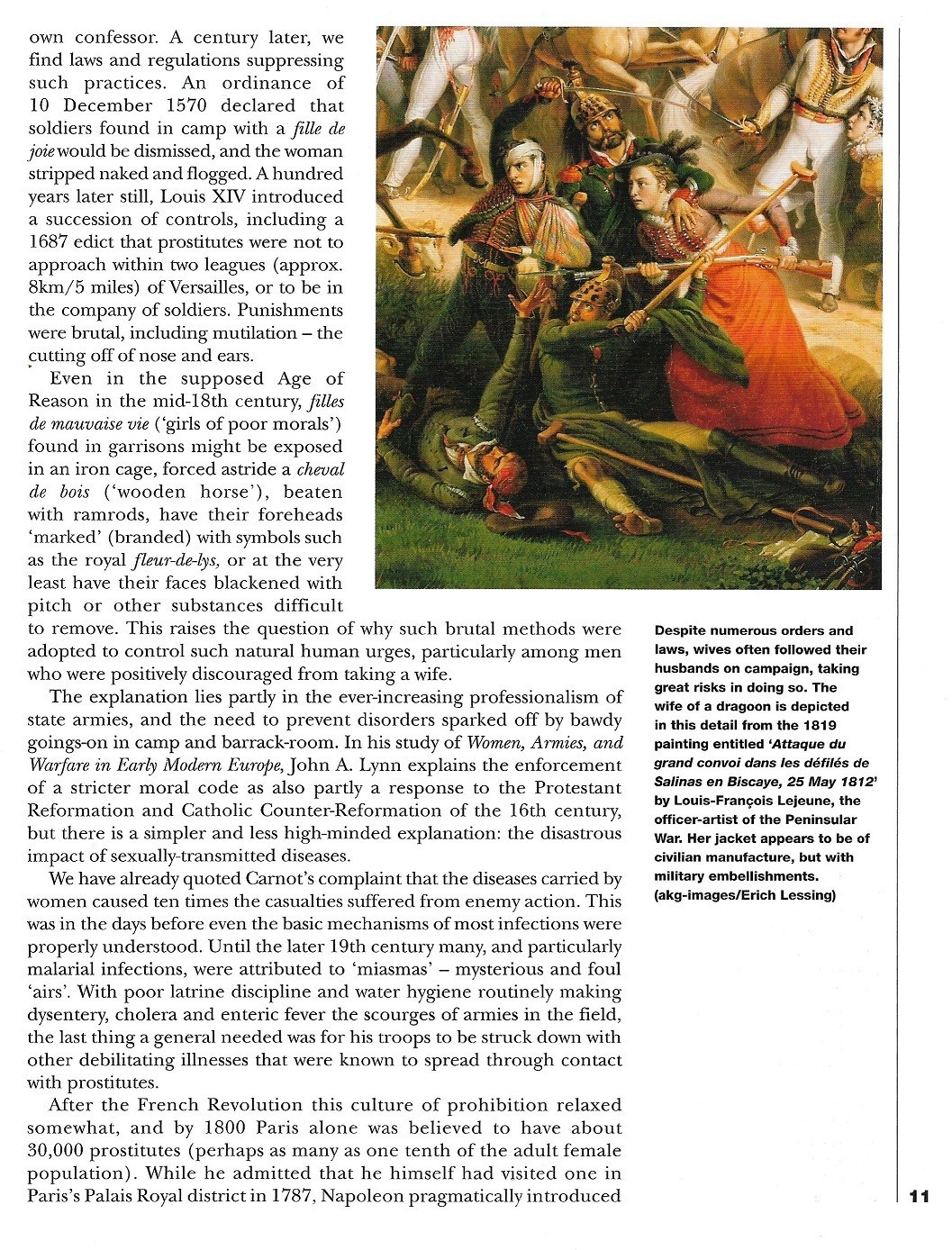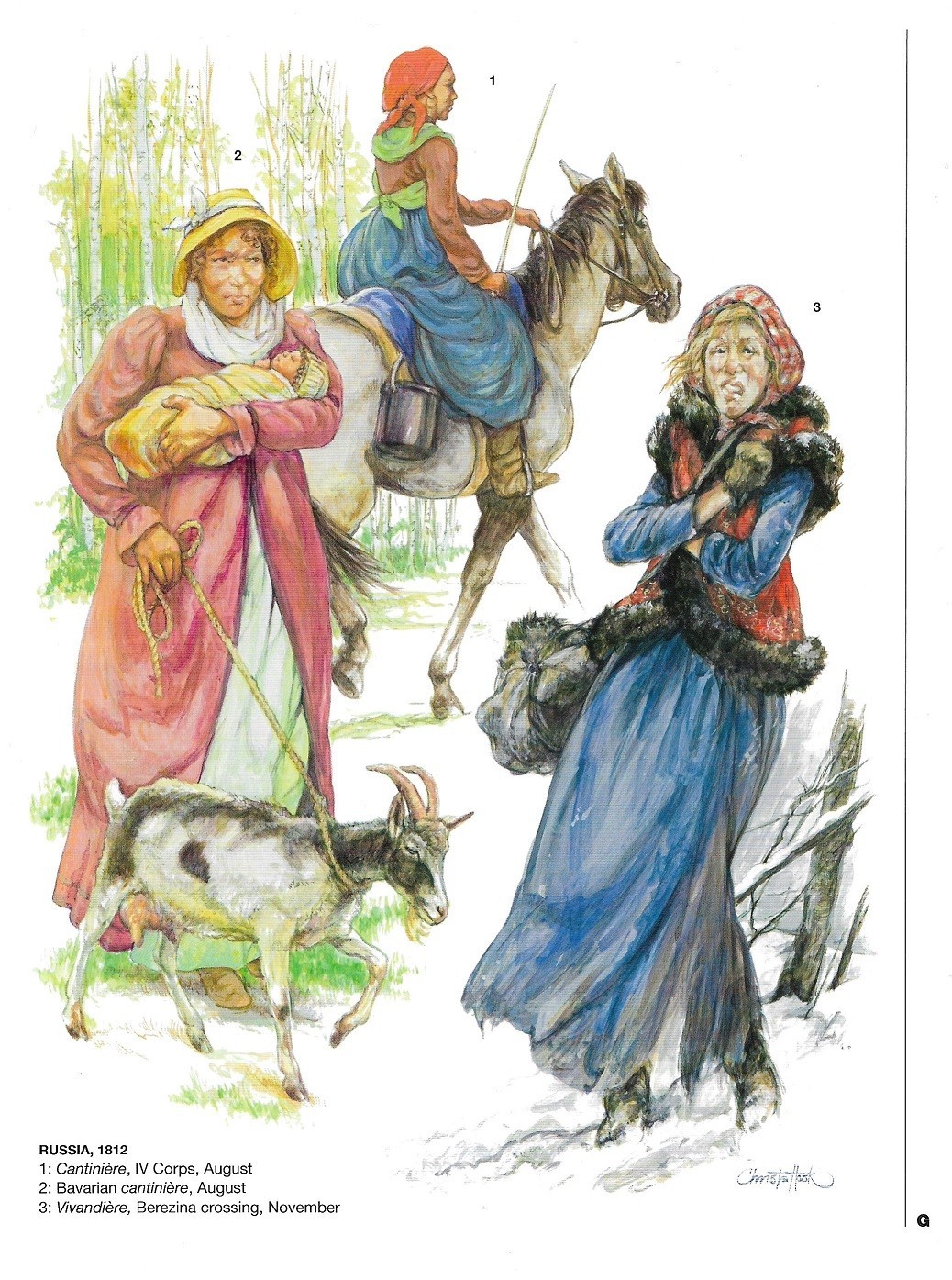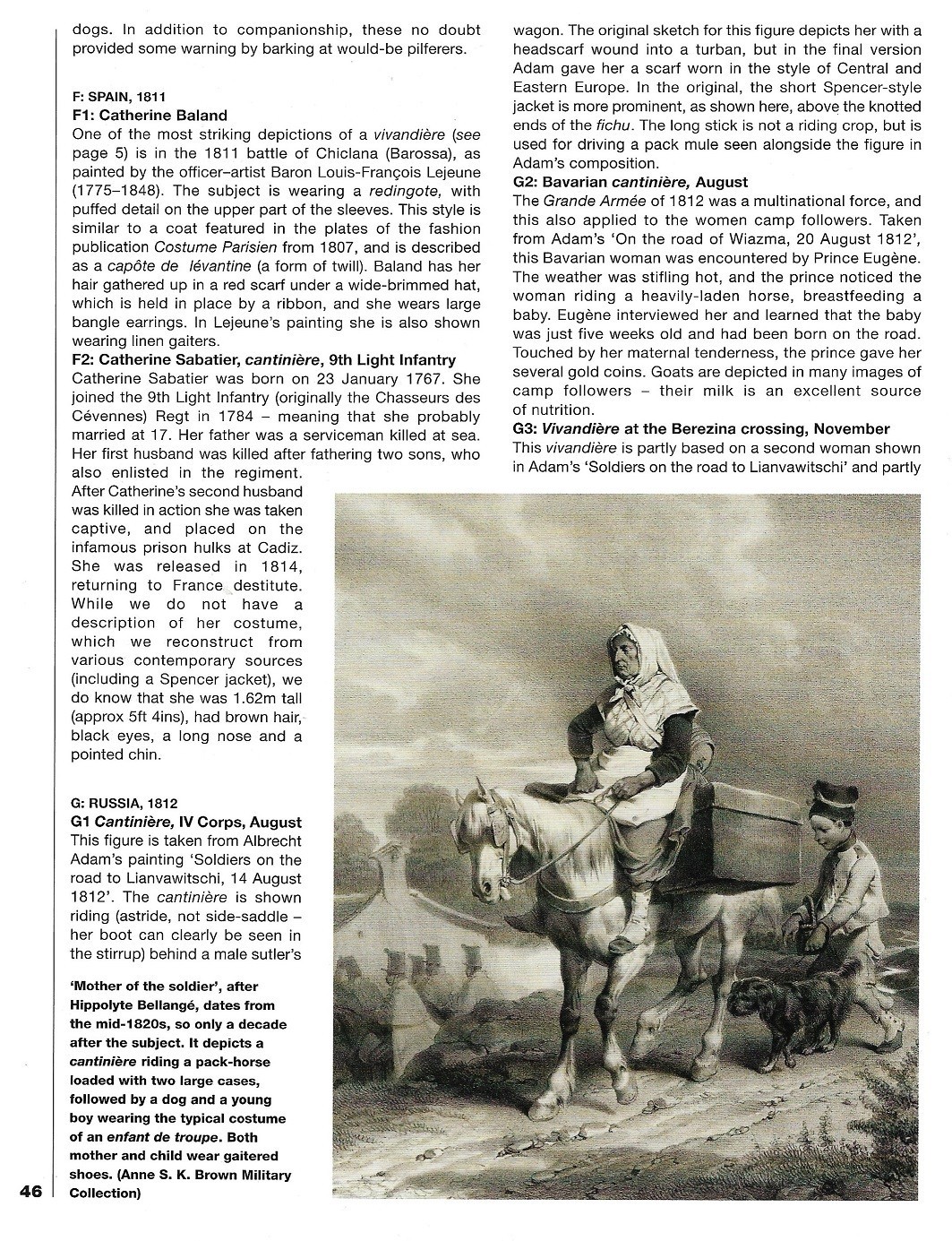HISTORY:
** While women have followed armies throughout history, the camp followers of Napoleon’s armies enjoyed a special status and renown. These soldiers’ wives and daughters who provided good and services for the troops were selected by unit commanders, and officially licensed and regulated by the regiments. Within the regimental family, their young sons were enlisted as enfants de troupe, joining the ranks in their teens. The camp women’s hardiness and courage in sharing the soldiers’ lives, even in battle, gained them lasting respect. This study of their history and appearance is deeply researched and illustrated from genuine contemporary sources and offers a fascinating look at these forgotten heroines. **
** Quoted from the back cover of the book.
THE BOOK:
Osprey Publications has released Napoleon’s Women Camp Followers as Number 538 in their Men-at-Arms series. It is a soft cover book with 48 pages. Included with the text are black and white photographs and color photographs, color illustrations, detailed captions and more. It has a 2021 copyright, a publication date of March 18, 2021 and the ISBN is 978-1-4728-4195-7.
Researched from genuine primary sources, this is the first book to explain and illustrate the organization, activities and personal stories of the female 'support staff' who played a major role in the day-to-day life of Napoleon's armies.
THE CONTENTS:
Introduction
- Definitions, and popular status
Women and the Armies
- Military marriages
- Soldier-sutlers
- Chaos in spring 1793
- Bonaparte's early campaigns: officers' indiscipline
- Prostitution
- The Civil Code, 1804
Organization
- Decree of 30 April 1793 - identification, and numbers
- Decree of 26 July 1800
- Army of Germany, 1809
- Grande Armée, 1812
The Role of Vivandières & Cantinières
- Goods and services
- Sutlers' tents
- Discipline
- Civilian canteens
Blanchisseuses
- In barracks and camp
- On campaign
Costume
- The early 1790s
- From Revolution to Directory and Empire
- Revolutionary cockades
The Regimental Children
- The ancien régime
- Law of 26 July 1800
The Legend of Marie Tête-Du-Bois
Select Bibliography
Plate Commentaries
Index
THE TEXT:
Author Terry Crowdy has written an excellent history about a military subject that has obviously been neglected to be detailed over the course of time. Terry Crowdy goes into great detail in regards to the women camp followers and their specific duties and responsibilities while serving as laundresses, seamstresses, sutlers or canteen keepers. Specifics are given as to what clothing the women and children wore, how far away from the army the women had to be when they set up their businesses, the types of carts or wagons they could have, the number of horses allowed, the type of tents or shelters they were allowed to have, what types of goods and services they could provide, etc., etc. Terry Crowdy also details who was allowed to have wives, what was required to get permission to get married, rules regarding families and what was expected of them as well as the rules for children, both male and female, what they were expected to do as apprentices and the ages that they were allowed to join the military, etc. Also discussed and detailed are the various campaigns undertaken, the countries they were in as well as the time frame of the campaigns. Along with his own words Terry Crowdy has also provided personal quotes and first-hand accounts from individuals providing specific details and pertinent information in regards to various women followers and specific actions they performed or incidents they were involved in. The text in the book is nicely written and well detailed. As I read through the text, I didn’t notice any spelling or grammatical errors. Grammar and spelling might not be an important factor to everyone however it is something that I take notice of and pass on my findings. I feel that if the text is well written then it shows that the author has taken the time to be professional with their writing. I did notice that in a few areas there was double spacing between some of the words but it takes nothing away from this fine volume and the spacing issue is more than likely from the printing process and is of no fault of the author. Anyone wanting to add an excellent reference and history book on women camp followers during the Napoleonic Wars to their personal library will be pleased with this very informative and interesting book.
THE PHOTOGRAPHS:
A total of 18 black and white photographs and 20 color photographs are included in this volume. The photographs featured are of period engravings and paintings. The photographs of the period engravings and paintings provide the reader with details of period uniforms and clothing as well as wagons, carts, gear, weapons, etc. They also provide a good reference for coloring which can be used as a painting guide for modelers if so chosen. Author Terry Crowdy stuck to the title of the book and chose subject specific photographs and did not include photographs that strayed from the main subject of the book. The majority, if not all, of the photographs will prove to be a wealth of information to the scale figure due to the details they contain. The images are obviously not always in scale and 100% accurate as to specific actions but I personally feel that they still do their job of providing information as there was obviously no photography equipment of any type back in that time period. So obviously, artists were free to use artistic interpretation when they created their paintings and illustrations. The majority, if not all, of the photographs will prove to be a wealth of information to anyone interested in the Napoleonic Wars due to the details they contain.
THE ILLUSTRATIONS:
There are 8 plates featuring a total of 23 color illustrations included in the volume by illustrator Crista Hook.
There are brief captions that accompany the illustrations stating the individual’s name or occupation. The Plate Commentaries chapter, that starts on page 44, provides well written and detailed larger captions that provide specific information on the individuals shown such as their names or occupation, the clothing they are wearing, their individual histories, dates, etc. The illustrations will prove to be valuable to the scale figure modeler as well as anyone interested in Napoleon’s women camp followers.
THE CAPTIONS:
The captions are well written and explain the accompanying photographs and illustrations in great detail eliminating any doubt as to what is shown. The captions go into very specific detail as to the specific individuals shown and their occupation, types of clothing worn, equipment carried and used, dates and locations and other such pertinent information. I was very impressed by Terry Crowdy’s captions as they are very helpful to the reader due to their detailed content as opposed to other captions that I have seen that are very brief and lacking in detail.
NOTES:
There are 2 notes included in this volume.
INFORMATIONAL CHARTS:
There is 1 informational chart included in this volume.
PROFILE:
There is 1 individual profile included in this volume and it provides the history of:
- Marie Tête-Du-Bois– cantinière
Cantinière is the French name for women attached to military regiments as sutlers or canteen keepers.
Osprey Publishing also offers Napoleon’s Women Camp Followers as:
eBook (ePub) ISBN: 978-1-4728- 4196-4
and
eBook (PDF) ISBN: 978-1-4728- 4193-3
Osprey Publishing’s, Napoleon’s Women Camp Followers is also available as a Kindle version through Amazon.
PRICE:
UK £11.99 / US $19.00 / CAN $25.99
This book was provided to me by Osprey Publishing. Please be sure to mention that you saw the book reviewed here on the KitMaker Network when you make your purchase. Thank you.
